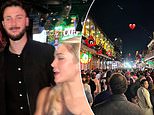From Cider With Rosie to seduction in Chelsea: He immortalised his magical rural childhood. But few realise Laurie Lee then became a devotee of swinging London
Generations have been entranced by Cider With Rosie, Laurie Lee’s magical account of his rural Cotswolds upbringing.
Now a new collection of reminiscences, some previously unseen, casts fresh light on his life. Here, in our final extract, he describes his move to London...
When my mother sensed that the time had come for me to leave home, she suggested, halfway between a giggle and a sigh, that I might do worse than go and live in Chelsea. She was a country girl, had never strayed far from her roots, but to her, a great reader of romantic novelettes, Chelsea was a place of high-tone fantasy, of bearded genius, swooning beauties and garlanded studios overhanging the river.
I’d only thought of Chelsea as a football team and a currant bun, but I took Mother at her word, believing I was carrying out some secret instruction, and when I set out to see the world I settled in Chelsea towards the end of the war, and have lived here, on and off, ever since.

Here, in our final extract, Laurie Lee describes his move to London, which began with a bedsit in Markham Square in Chelsea. Above, Lee is pictured in 1962
I began with a bedsit in Markham Square, the top-floor window commanding a history of time. My friend and landlord was the Keeper of the Public Records Office, a cultured and careful man, who, in order to save fuel, went to bed at sundown and read Proust by the light of a saucerful of glow-worms sent up from the country in jam jars.
Chelsea, then, had no cars, few people and vast emptying skies enlivened only by steam from Battersea Power Station.
The King’s Road had curled old ladies selling needles and thread, workmen’s cafes serving kipper teas for a shilling; upside-down butcher’s shops, with meat hanging under the counter; and dairies with china eggs and cardboard cows decorating otherwise empty shelves.
I don’t suppose Chelsea differed, in this regard, from anywhere else at the time, but it had that distinguishing presence my mother’s instinct had promised, and Markham Square certainly was a compact little enclave of oddities, a fringe gathering of painters, poets and muses.
Halfway through the morning I’d see Dylan Thomas, like a plump, furry little mole, pop up from his basement opposite and go padding off to the pub. If we met in the street we didn’t speak, but nodded. I was teetotal in those days, and certain lines were drawn.
Two doors to my left lived the incomparable [foreign correspondent] James Cameron, and we used to play the violin and guitar together. Not well; but those were days of no discos and little public entertainment, and sometimes we hired an old pony trap and toured the streets in a selfless attempt to enrapture the populace.
Further up, [the novelist] Elizabeth Smart, her face emblazoned with light, mothered the happy brood of [poet] George Barker’s children; while across the square, issuing nervously from some mysterious recess of his own, the poet Paul Potts, a tall, stooping figure, stumbled his way to the shops.
He caused me no offence, but thinking there were too many poets around, I took a shot at him one day with an airgun. The pellet hit him in the foot, he leapt in the air, turned round and berated some innocent old woman behind him, and left immediately for the Hebrides.

Chelsea was a magnet for trendsetters. Lee moved to the borough in the late Forties, early Fifties when he was a bachelor
In Markham Square I saw the last days of the war, with German bombers dropping cascades of coloured lights, Chelsea never looking more beautiful, all-night parties in Victorian coal-holes and sunken cheeks in the morning. Chelsea grew increasingly deserted.
One bright August evening I stood in the middle of the King’s Road and shot an arrow from The Markham Arms to the old Town Hall. It bounced unhindered up the empty street. Only a stray dog stepped out of the way.
My quiver empty, my arrows spent, I moved into [the novelist] Edna O’Brien’s house in Carlyle Square — though unhappily our habitation did not coincide.
It was the late Forties, early Fifties. The last all-clear had sounded. People returned to their abandoned houses. Chelsea took a long, deep breath and prepared for pleasure, and began to put on paint like a debutante.
Women shrugged off their square-rigged shoulders and military suits and became beribboned and cuddly again.
A bachelor then, I was occasionally visited by girls in loose Hungarian blouses. While from downstairs in the basement one heard slaps, shrieks of laughter and the padding of bare feet on the floorboards. Sex had never seemed more carefree or funnier.
From the winter grey of war, Chelsea was turning its expectant face towards that pleasure dome it so hoped to become. But in those early Fifties, before the Terence Conrans and the Mary Quants had slapped down their manorial rights on the place, there still remained remnants of that elegant village Mother had imagined Chelsea to be — T. S. Eliot, in clerical hat and dark mackintosh, pushing [poetry editor] John Hayward round the streets in his wheelchair, Eliot slightly bent and listening to Hayward’s incessant chatter as though eloquence was the vehicle’s chief propellant.

Lee, 48, above his childhood home in Slad in Gloucestershire - he spent most of his life in the village before moving to London
Then Sir Alfred Munnings [the artist famous for painting horses], in hacking jacket and jodhpurs, striking the railings with his riding crop; [sculptor Jacob] Epstein hurrying from his studio showered in sky-blue clay; [poet and critic] Edith Sitwell walking in reverie . . .
Her brother, Sir Osbert, lived a few doors away, a man of deceptively livid appearance, even when some children and I, one Bonfire Night, put a flaming rocket through his first-floor window and burnt a hole in his Elizabethan arras.
All gone now, that lot. Even the long-legged schoolgirl who used to deliver my newspapers on rollerskates and was later to marry a lord. I married, too, and moved to Elm Park Gardens, several streets away.
This three-sided square of kipper-coloured houses was stuffed then with families from the bombed East End. The last time, perhaps, for such a select Chelsea garden to ring with the jungle cries of the scab-kneed poor.
No ‘Simons’, ‘Samanthas’ or ‘Clarissas’, yet, but ‘Sids’ and ‘Berts’ and ‘Brendas’. The boys, scrub-haired and nutty-headed, sons of the coastal marauders of western Europe, having drifted upriver on tides of generations; and their sisters, sharp-eyed, squinting, sly and seductive: ‘You a hundred yet, Mr Lee?’
All day the boys played cricket in the road and the girls chalked square games as old as Byzantium. Or stood on their heads in the garden in squealing rows of stalky thighs and blooming knickers.
Mid-Fifties, pre-television, perhaps never again in Chelsea would families live out of doors on summer evenings, children playing, mothers gossiping on doorsteps, chewing hard peas and shrieking with laughter, babies rocking, dogs barking, cats slinking, pigeons panicking, while short bantam husbands, settling their caps and mufflers, trotted away down to their pubs.
Among this rollicking community, I was privileged to rent a small flat in a house owned by the Chelsea Housing Improvement Society, a discreet little charity devoted to preserving the past and to which my slender cultural pretensions endowed me. Next door a young painter, of some renown and promise, lived with a wife of whom he was coldly and clinically jealous.
He kept her locked up in the basement and took her out twice a day to the gardens, and told her to run up and down. This done, he took her home and locked her up again. She turned out to be a better painter than he was.
Before the coming of the sterilised wine bars and the brewer’s boardroom of extravaganzas, Chelsea offered a treasury of little rusticated pubs — The Potter, The Markham Arms, The Eight Bells, The Cadogan, The Roebuck, The Man In The Moon, and Finch’s.

Author Laurie pictured with his wife Cathy. Laurie Lee’s enchanting memoir Cider With Rosie, an account of life in a Cotswolds village around the time of World War I, brought the author global fame
The Eight Bells had [jazz clarinettist and Daily Mail cartoonist] Trog with his band of Trad Jazz upstairs, but otherwise into the Sixties most of our pubs had scrubbed institutional tables and benches, with Battersea mums and dads drinking their twinkling stout in happy silence and swinging their short legs a foot from the floor. Towards the mid-Sixties the tribal cries of the East End kids were silenced, they and their families swept up into the council’s new filing boxes down World’s End way.
We were not to hear their lively calls again. The dumb, parked motor car began to occupy their chalked games and scuffed playgrounds, and with them a new breed of money.
In Chelsea, especially, money and the inchoate days of returning peace created a space to be filled with pantomime, plumage, sensation, invention and show.
There was a more opulent tribalism now which, reacting against the uniformity of war, rejected, then reflected, in increasingly extreme forms, more frenetic group uniformities.
Teds, skinheads, boys in braces and bovver boots, Mods and Rockers, a pretty fluttering of miniskirted girls, Twiggy models like boys, a sweep of Samanthas in pantaloons from the hunting shires, then more lately the grotesqueries of Punk. Chelsea Punk, where it was fathered, suggested revolution, and at the beginning perhaps it was; but now it seems to conform to its own diktat as regimentally as all the others.
At first one could but applaud these cartoons of protest — the secret zips and leg straps, pierced ears and noses, electrified hair and hints of self-flagellation.
Punk — commercialised and domesticated — is now just another fragment of Chelsea graffiti for which we can still feel some declining affection. But at least it let in the girls, so they could walk hand in hand with their men, each stamped black as Lucifer in their chains.
We’d seen all this expanding, in spurts of ebullience, from their drab, end‑of‑the-war beginnings to their kaleidoscopic present, from the day when [the writer and raconteur] Quentin Crisp first stepped through pools of fastidious disapproval along pavements now blocked by his unremarked imitations.
Over the years we’ve watched Chelsea emerge from its quiet, cultured chrysalis to the diamond-dotted butterfly it has now become.
It has passed through its stages of transformation, from greenery-yallery to Reject-Habitatory, meat pie and mash to Pizza Express, from beans with everything to jeans with everything, second-hand bookshops replaced by little-rich-girl boutiques customarily named ‘Ibiza’ or ‘Shangri‑La’.
Chelsea is rich now, one of the prime oil-gushers of London, its fame and fantasies lubricated worldwide by fashion sheets, films and the jet plane.

Pictured is Annie Lee, played by Juliet Stevenson, in the film adaption of Cider With Rosie
The old pubs have been deloused, degutted, carpeted and tinselled, their names the only remnant of what they once were, like the names of old towns since violated. Almost permanently scaffolded, Chelsea still has some handsome old houses whose value increases three times a day — inhabited by handsome couples, tall, tanned and double colour-spread, with permanently scaffolded marriages.
A place still almost completely unchanged since its founding, by Whistler and friends a century ago, is the Chelsea Arts Club towards the north end of Old Church Street.
A small door in a plain wall opens into something only Chelsea could offer, a charming little house of taste and antiquity — reading rooms, billiard rooms, bedrooms and dining rooms all hanging with excellent pictures of the founding time.
And beyond that all, a walled garden past belief: trees, lawns, fountains and a resident tortoise.
When I joined the Arts Club, in the late Forties, membership was almost entirely confined to artists, their models and mistresses, their varnishers, picture framers and agents. It was leisured and usually half-empty.
Now the Arts Club has suddenly become The Place To Be, and almost any evening you’ll see a coloured crowd pouring through the small plain door like bees drawn into a hole — dark-suited workers, bright striped drones, royal jelly-fed beauty queens. The past and the present are preserved in the Club, from white-whiskered artists to sugar-fringed models.
Meanwhile, up and down Old Church Street wander the tourists, maps in hand like Minoan clay tablets, asking: ‘Vich vay, pliss — the Chelsea Road, yes? The King’s Road, pliss?’
I love Chelsea - after all, it's my second home - but for all its slick shops and restaurants, licensed to print T-shirts and money, it has largely become a parody of what it imagined itself to be, a place to which people travel great distances to find themselves taking photographs of each other, an arena almost entirely filled with spectators.
- Taken from Village Christmas: And Other Notes On The English Year by Laurie Lee, to be published by Penguin Modern Classics on November 5, £9.99. To pre-order a copy for £7.99 visit mailbookshop.co.uk or call 0808 272 0808. Offer until November 7, P&P free on orders over £12.
Most watched News videos
- Scottish woman has temper tantrum at Nashville airport
- Tesla Cybertruck explodes in front of Trump hotel in Las Vegas
- Mass panic as New Orleans attacker flies down Bourbon street
- Shocking moment zookeeper is fatally mauled by lions in private zoo
- Horrific video shows aftermath of New Orleans truck 'attack'
- Meghan Markle celebrates new year in first Instagram video
- Tesla Cybertruck burns outside Trump hotel in Las Vegas
- See how truck that drove into crowd made it through police barrier
- Cheerful Melania Trump bops to YMCA at Mar-a-Lago NYE bash
- New Orleans terror attack suspect reveals background in video
- Plane passenger throws drink at flight attendant in boozy fight
- Horrifying moment yacht crashes into rocks and sinks off Mexico coast

































































































































































































































































































































































